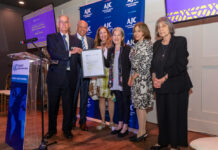
In 2020 and 2021, Israel weathered storms on multiple fronts: ongoing response to the pandemic and the distribution of vaccines and boosters, as well as the violent Israel-Hamas conflict flare-up in May 2021.
In Israel’s time of need, Israel advocacy organizations in the United States with the help of donors, have risen to the occasion to assist the nation-state, and those organizations have seen an increase in giving this year.
Since 2019, American Friends of Magen David Adom, which assists Israel’s emergency medical service, has seen exponential growth in revenue from the Philadelphia region, from $578,522 in 2019 to $1,025,711 in 2020 and $2,780,368 in 2021.
“Our very strong fundraising year is really in response, in many ways, to the tremendous needs that Magen David Adom has faced as a result of events happening in Israel,” AFMDA CEO Catherine Reed said.
Since the beginning of the pandemic, MDA has provided testing and vaccinations. After the deadly Mount Meron disaster, a crowd rush that killed 45 on April 30, MDA was the first to respond and, this May, MDA was able to treat victims within hours of Hamas rocket attacks, largely thanks to the proactive giving from U.S. donors, Reed said.
AFMDA has not been alone in having a good fundraising year.
Jewish National Fund-USA raised $4 million in 2021, $1.5 million above its fundraising goal, according to JNF-USA Eastern Pennsylvania President Dale Danilewitz.
“We make long-term philanthropic investments in Israel,” Danilewitz said, “meaning that when Israel faces a crisis, we already have the infrastructure needed to help them respond effectively and remain resilient.”
JNF-USA has effectively extinguished forest fires in Israel’s Eshkol/Gaza Envelope region and provided clean-up resources after the Western Galilee Now Tourist Information Center in Akko was destroyed.
In October, six JNF-USA Eastern Pennsylvania lay leaders took part in JNF-USA’s first official mission to Israel since the onset of the pandemic, and they are preparing for the Celebrate Israel Mission from Jan. 14-20.
The American Jewish Committee Philadelphia/South Jersey saw a 20% increase in donations this year, Regional Director Marcia Bronstein said.
AJC has initiatives to counter the boycott, divestment and sanctions movement and to strengthen ties between Israel and the American diaspora.
“Our donors tend to have a more nuanced, long-term approach to the conflict,” Bronstein said. “They remain hopeful for peace in the region. The path to peace sometimes is not very clear, but they do know that by supporting AJC, they’re promoting Israel’s safety and security, and those are things they really care deeply about.”
These organizations have largely attributed increased giving to the challenges Israel has faced this year and growing antisemitism in the U.S.
“It’s partially because of rising antisemitism,” Bronstein said. “Our donors are motivated to do something … It comes up in the majority of our conversations with our donors.”
And though no organization wants to see increased antisemitism and anti-Israel sentiments, those incidents correlate with an increase in giving.
“[Donors] see it in our own emails or Facebook page and social media, and people respond,” Reed said.

A JNF-USA firefighter putting out a wildfire in the Eshkol/Gaza Envelope region of Israel
| Courtesy of Jewish National Fund-USA
Even though many of these nonprofits experienced an increase in giving this year, not all members of the Jewish community are interested in donating to them.
Zev Guttman of Center City hasn’t donated to any Israel advocacy organizations because of his focus on giving locally.
“Our sages say that a man who is very wealthy and gives proudly to all kinds of causes in the community or the world, but then his own wife and children go hungry with tattered clothing — that man is a wicked person,” Guttman said. “Charity starts at home. Once you’re done taking care of your home, then you expand that charity by giving to your immediate community.”
Instead of giving to larger organizations, Guttman, who considers himself “a man of extremely modest means” and financially impacted by the pandemic, prefers to give to Jewish communities in which he’s already involved, such as B’nai Abraham Chabad and Congregation Mikveh Israel
in Philadelphia.
By giving locally, Guttman can more easily see the impact of his donation.
Even without giving money to Israel advocacy organizations, Guttman is still a proud supporter of Israel. His family lives in Tzfat, and he hopes to one day make aliyah to Israel. If he were to move to Israel, he could begin giving to Israeli organizations because Israel would become his local community.
If Guttman were to give to larger Israel advocacy organizations, he would seek greater transparency from them, wanting organizations to “show exactly how their money is being spent and where it’s going.”
In addition to contending with those whose giving priorities lie elsewhere, Israel advocacy organizations must also confront criticisms of those disagreeing with policies or actions of the Israeli government. Some organizations are using any ambivalence toward Israel to their advantage.
“What those kinds of sentiments allow is for us to educate people about Israel,” Reed said. “In many ways, AFMDA is a great argument to the ridiculous attitudes people have and the unfortunate rise we see [in antisemitism] from time to time.”
AJC is continuing to focus on advocacy campaigns, rather than explicit fundraising campaigns, knowing that involving the community in its mission translates to increasing giving. Like other organizations, AJC is trying to keep the fundraising momentum of the past year.
“There’s a lot of work to be done,” Bronstein said. “American Jews are feeling like (they’re) on the defensive with anti-Zionist voices. We’re aware of those challenges, and we want to work towards a world where there’s zero
tolerance.”
[email protected]; 215-832-0741






